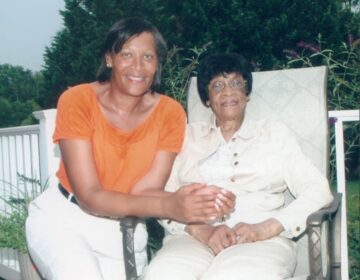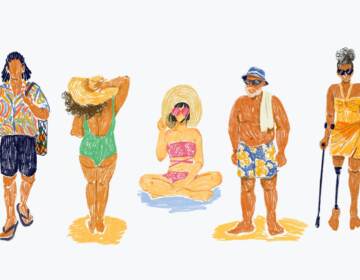Reconsidering hormone replacement therapy
In 2002, when a giant study ended, lots of women threw their estrogen pills in the trash. In her late 50s, Barbara Paulsen reexamines the latest evidence for herself.
Listen 10:15
Barbara Paulsen, 59, runs on a beach in Carmel, California. She plans to do everything she can to stay active as she ages. (Teo Furtado)
Barbara Paulsen is host and producer of Midway, a podcast about navigating midlife transitions.
This story starts with my love of dance, and my fear of aging.
I love Zumba, swinging my hips to Latin music with a group of other women.
In the last few years though — with my arthritic feet and the 20 pounds I’d gained — my body started to feel so tired and heavy. The dancer in my head was so different from what I saw in the mirror.
Then I started noticing an advertisement popping up on my computer. It was for an anti-aging clinic that seemed to know what was going on with me: weight gain, insomnia, fatigue, lack of energy, hot flashes.
I was a few years past menopause — no more menstrual periods — but I still had hot flashes. The symptoms were manageable — nothing I couldn’t live with. But I just felt like I was aging faster. The ad suggested a lack of sex hormones might be the problem.
These days, the official advice is to not take hormone replacement therapy after menopause unless your symptoms are pretty bad. But, not that long ago, the advice was the complete opposite.
What happened?
I called up my sister Kathy Coronado to help me remember what menopause was like for our mom, who was 40 when she stopped getting her period.
“My memory is that she thought she was pregnant,” Kathy says. “I think I overheard her on the phone.”
My mom went through what she called “the change” in 1966, the same year a gynecologist named Robert Wilson published a book called “Feminine Forever.” He explained that when women lose their ability to get pregnant, their bodies stop producing estrogen. And his take was that, when women’s estrogen dries up, they do too.
Wilson argued that menopausal women were suffering from a hormone deficiency disease, like a diabetic who needs insulin. And he offered a solution: if they’re losing vitality, if they’ve run out of gas, all they have to do is top up their tanks with estrogen.
In the decades after “Feminine Forever,” a women’s health movement rose up to challenge Wilson’s campaign for women to stay “feminine forever.” They objected to what they called “the medicalization of menopause.” The loss of estrogen, they said, is just the natural aging process. But estrogen’s proponents countered that women didn’t used to live so long. These days, women may spend close to half their lives without estrogen. So what does mean for their health?
By the 1990s, the science had actually caught up with Wilson’s advice. Multiple studies suggested hormone therapy for menopausal women could prevent bone loss, heart disease, and even dementia. Not long after, drug companies started talking directly to women. And they hired aging supermodel Lauren Hutton to use her gap-tooth sex appeal to convince women to take charge of their health with hormone replacement therapy.
By 2000, 15 million American women were taking it.
Then, in July 2002, the National Institutes of Health called a press conference in Washington. They announced they were calling the largest study on hormone therapy to a halt — years early.
“Women should not start or continue this therapy to prevent heart disease,” the study’s leader said. “The findings show it doesn’t work.”
The study, called the Women’s Health Initiative, focused on strategies to prevent major causes of death in women. Taking prescription hormones was thought to protect against heart disease and potentially let women live longer.
“In fact the therapy increases the risk for heart attack or stroke,” the lead researcher said. “Additionally, it increases the risk for breast cancer and for blood clots.”
That news — that hormone therapy increased the risk of breast cancer — sent millions of women running to their phones to call their doctor. The bottom line: Women should get off hormone therapy, now.
And that’s what lots of women did, threw their hormone medicine in the trash. And many went back to experiencing the symptoms of menopause.
Noticeable symptoms can vary greatly woman to woman. But, noticeable or not, all women experience changes. Estrogen doesn’t just affect a woman’s reproductive organs. It triggers subtle shifts in her skin, hair, heart, bones — and her brain.
“I don’t think people realize how bad menopause is,” says my friend Janet Firshein, who experienced particularly fierce hot flashes. “It’s like this alien taking over your body. You wake up in the middle of the night and you’re like sweating, dripping in sweat. I would sometimes literally stick my head in the freezer.”
My friend Cynthia Gorney suffered severe mood swings. “I was having a series of mini nervous breakdowns, depressive cycles that were pretty deep,” she says. “I would be weepy and foul tempered.”
My sister Kathy and I noticed yet another symptom: Swiss cheese brain. “The other day I was in the kitchen and all the dishes were cleaned up,” she remembers. “And I said, ‘God love that husband of mine.’”
When she thanked him for doing the dishes, he looked at her like she was crazy. “Wait, did I do them?” she said to herself. “I couldn’t remember if I did them or not.”
My mother didn’t take hormones. Neither did any of my sisters. And when I first hit menopause, I didn’t consider it, either.
“I would have to have really severe symptoms for me to do it,” Kathy says. “I just worry about cancer.”
She’s not the only one. For years after the 2002 study, the prevalent message floating out there was that hormone replacement therapy causes breast cancer. But that message is wrong; the findings from Women’s Health Initiative got distorted.
Here’s what happened: You have a drug that women take at menopause, which is typically around the age of 51. But instead of testing the drug on women in their fifties, most of the women in the study were in their sixties, seventies, or even eighties.
To find out why the women in the study were so much older, I spoke to Robert Langer, an epidemiologist who was one of the study’s principal investigators. He says the Women’s Health Initiative wasn’t designed to determine whether hormone replacement was a good idea for women in their fifties. Scientists already knew it was. Plenty of studies had backed that up. Instead, he says, what they were trying to find out was whether women well past menopause, 60 and older, should also get on the drugs — “to see if what we already thought was true for younger women would hold for older women.”
The study determined that hormones do not prevent disease in older women. And that’s really important. But that’s not the message that got reported. “The headline of the press release said: ‘Major hormone study stopped for breast cancer harm,’” Langer says. “I saw that and I about blew up!”
As it turns out, the increased risk of breast cancer was not statistically significant. But the media blitz carrying that message was huge. Breast cancer is the disease women fear most. So when headlines said hormone therapy increased that risk — and caused heart attacks—Langer says that scared millions of women in their fifties off a drug that may have helped them live longer.
A generation later, the science is clear: Women who start taking hormones near menopause actually lower their risks for bone fractures, dementia, and heart disease. But that news has been slow to trickle down to primary care docs — and slow to change the recommendations doctors give women.
While I had Langer on the line, I couldn’t resist asking him about my own situation. Should I consider hormone replacement therapy?
“I can’t really give you clinical advice,” he says. “But I can tell you a sort of sidewalk consult.”
He says that a woman like me, who’s within ten years of menopause and has hot flashes or thinning bones or some other reason to take hormones, is in the clear. “You’re certainly well within the envelope that there is no increased risk,” he says.
But since my symptoms are mild, he’d recommend hormones only if I had a family history of heart disease or osteoporosis or even dementia.
Which I do. All three. My father had a heart attack in his fifties. My sister’s had several blocked arteries. And my mother developed osteoporosis and dementia and then died of heart failure at 83. When I talk to my own doctor, she agrees: given my family history, getting on hormones makes sense. But she urges me to be extra sure to get regular mammograms and check-ups.
I’ve been on hormones for a year now. I feel good. And, because I’ve also been eating less and lifting weights, I’ve managed to lose 20 pounds.
I don’t have any magical ideas that hormones are going to keep me young. I’m perfectly wrinkled for my age. But these days, as I salsa across the dance floor, I do feel a bit lighter on my feet.
WHYY is your source for fact-based, in-depth journalism and information. As a nonprofit organization, we rely on financial support from readers like you. Please give today.





